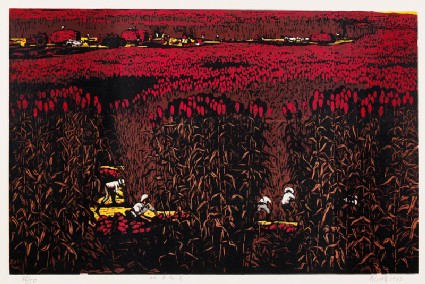Chinese Prints 1950-2006 in the Ashmolean Museum
A catalogue of the Ashmolean’s collection of Chinese prints from 1950-2006 by Weimin He and Shelagh Vainker (published Oxford, 2007).

Publications online: 129 objects
September in the North
-
Literature notes
The eternity of art is based on the perfect unity between its form and content.
Chao is regarded as one of the key founders and the most influential figure of the Great Northern Wilderness School, which was initiated in Heilongjiang province in the late 1950s by a cultural section of the army. As an agricultural worker and later an editor and printmaker for The Beidahuang Pictorial, Chao has used non-key block techniques with dense and rich colours to depict the vigorous beauty of the northern land. His style has changed over the years from realism showing the influence of Soviet socialism, to romanticism, with Chinese calligraphic inspiration, to semi-abstraction and simplicity. He has been Director of the Chinese Artists’ Association and Chairman of the Heilongjiang Artists’ Association. Two galleries have been founded in his name, in Harbin and in his hometown, Heze. -
Description
This work presents a sorghum harvest scene in the Great Northern Wilderness state farm in northeast China, where the artist worked as an agricultural worker, an editor, and an artist. It shows how, after a few years hard reclamation, the wasteland has been transformed into a fertile agricultural resource. Over the years Chao has been using non-key block techniques with dense and rich colours to depict the wild beauty of the northern land.
-
Details
- Associated place
-
Asia › China › Heilongjiang province (subject)
- Date
- 1963
- Artist/maker
-
Chao Mei (born 1931) (printmaker)
- Material and technique
- multi-block woodcut, printed with oil-based ink
- Dimensions
-
mount 60.9 x 81 cm (height x width)
sheet 52.5 x 74.7 cm (height x width)
sheet 40 x 62 cm (height x width)
- Material index
- Technique index
- Object type index
- No. of items
- 1
- Credit line
- Purchased, 2007.
- Accession no.
- EA2007.8
-
Further reading
Weimin He, and Shelagh Vainker, Chinese Prints 1950-2006 in the Ashmolean Museum (Oxford: Ashmolean Museum, 2007), no. 34 on p. 42, p. 53, illus. p. 42
Past Exhibition
see (1)Location
-
-
Ground floor | Room 11 | Chinese Paintings

-
Ground floor | Room 11 | Chinese Paintings
Objects are sometimes moved to a different location. Our object location data is usually updated on a monthly basis. Contact the Jameel Study Centre if you are planning to visit the museum to see a particular object on display, or would like to arrange an appointment to see an object in our reserve collections.
Publications online
-

Chinese Prints 1950-2006 in the Ashmolean Museum
The eternity of art is based on the perfect unity between its form and content.
Chao is regarded as one of the key founders and the most influential figure of the Great Northern Wilderness School, which was initiated in Heilongjiang province in the late 1950s by a cultural section of the army. As an agricultural worker and later an editor and printmaker for The Beidahuang Pictorial, Chao has used non-key block techniques with dense and rich colours to depict the vigorous beauty of the northern land. His style has changed over the years from realism showing the influence of Soviet socialism, to romanticism, with Chinese calligraphic inspiration, to semi-abstraction and simplicity. He has been Director of the Chinese Artists’ Association and Chairman of the Heilongjiang Artists’ Association. Two galleries have been founded in his name, in Harbin and in his hometown, Heze.
Notice
Object information may not accurately reflect the actual contents of the original publication, since our online objects contain current information held in our collections database. Click on 'buy this publication' to purchase printed versions of our online publications, where available, or contact the Jameel Study Centre to arrange access to books on our collections that are now out of print.
© 2013 University of Oxford - Ashmolean Museum


